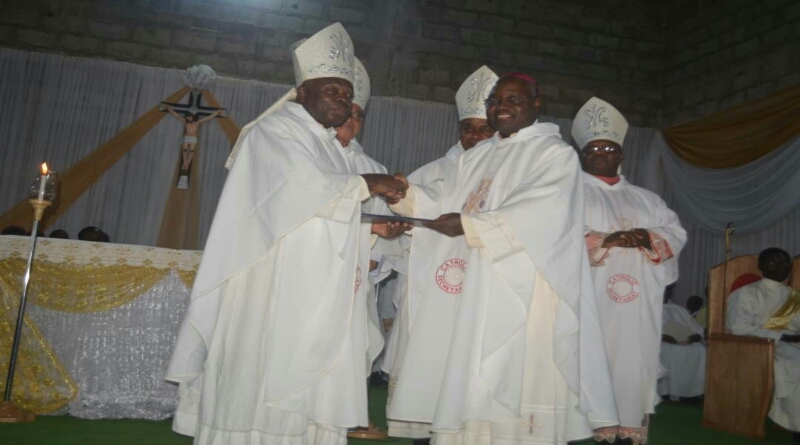Pentecost: The fulfilled promise of the Helper
by ARCH BISHOP · June 5, 2022
Pentecost Sunday, Year C, 5th June, 2022, St. Ignatius of Antioch Parish, Karu, Abuja. Homily by Archbishop I. A. Kaigama.
Readings: Acts. 2: 1-11; Ps. 103(104): 1, 24; 29-31, 34; Rm. 8: 8-17; Jn. 14: 15-16, 23-26
My visit to St. Ignatius of Antioch falls on this great feast of Pentecost, which concludes the season of Easter. Happy Pentecost! May the Holy Spirit inspire Christians and all Nigerians to do whatever is true, whatever is chaste, whatever is just, whatever is holy, whatever is worthy to be loved, whatever is of good repute .… (cf. Phil. 4:8); give us the courage of St. Ignatius who, condemned to death, and transported to Rome to be thrown to the wild beasts, held on to his faith with great conviction.
Our feast of Pentecost, originally a post-harvest thanksgiving feast celebrated on the 50th day after the Passover feast by the Jews is a commemoration of the descent of the Holy Spirit, the Third Person of the Blessed Trinity who presents Himself in the forms of ‘Tongues of Fire’ (cf. Acts 2:3), ‘Dove’ (cf. Matt. 3:16, Mk. 1:10, Jn. 1:32) and ‘Wind’ (cf. Acts 2:2), upon the Apostles, the Mother of Jesus and those gathered in the upper room in Jerusalem.
The first reading describes the fulfillment of the promise of Jesus to His Apostles that they would receive “Power from on high.” The Holy Spirit which descended upon the Apostles led to a confident proclamation of the Good News of Jesus, understood by everyone there, in their native languages, thus reversing the confusion of tongues at the Tower of Babel, as described in Genesis 11, and bringing the gift of unity in diversity, as well as the ability to dialogue and come to consensus. The descent of the Holy Spirit is also the birthday of the Church, during which the Holy Spirit empowered the early Christians to bear faithful witness to Christ and also strengthened them to endure martyrdom.
In St. Paul’s letter in the second reading, he tells us about the spiritual gifts of the Holy Spirit such as prophecy, teaching, administration, acts of charity, healing and speaking in tongues, and how they enrich the Church. He also lists the fruits of the Spirit in his letter to the Galatians: love, joy, peace, patience, kindness, goodness, faithfulness, gentleness and self-control” (5:22-23), and insists that that these spiritual gifts are to be used for the benefit of others and for the building up of the Body of Christ.
The account of John in our Gospel today shows how Jesus empowered the Apostles by breathing on them the Holy Spirit to preach the Gospel to all nations. There is a close connection between the gifts of peace and forgiveness as Jesus commissions them: “Receive the Holy Spirit. For those whose sins you forgive, they are forgiven; for those whose sins you retain, they are retained.” This is a call to sacramental reconciliation in confession and the need to love and forgive each other in a world that is fiercely judgmental and vengeful.
The Holy Spirit helps us on our Christian journey which becomes impossible and impracticable without His help. The Holy Spirit helps us to pray (cf. Rom. 8:26). St. Paul tells us that the Spirit helps us in our weakness when we do not know what to pray for and the best manner to channel our prayers. The Holy Spirit helps us to lead a life of righteousness, we need the Holy Spirit to enable us make right choices. The Holy Spirit is a Teacher who reminds us of the teachings of Jesus Christ (cf. Jn. 14:26).
Nigerians must beg the Holy Spirit to teach us to uphold the sacredness of life, especially today as blood is poured like water, people’s freedom and dignity violated by bandits, terrorists, kidnappers and other criminals, who capture people and keep them under inhuman conditions for monetary ransom or kill them outrightly.
We implore the Holy Spirit to teach us and guide us to the truth (Jn. 16:13). We invoke the Holy Spirit to help us correct the erroneous understanding among some Christians today who confuse their imaginations, dreams or psychological delusions with the promptings of the Holy Spirit, going on to speak about politics and secular matters with dogmatic certitude; making categorical statements about which party or candidates will win elections. Rather than say these are their political speculations, projections or rational calculations they claim divine authority! These mundane predictions often fall wide off the mark. Those political “prophets” are attention seekers trying to woo gullible people.
St. John urges us to “test the spirits” (cf. 1 Jn. 4:1-10) and not to confuse momentary phenomena with the action of the Holy Spirit. Let us realize that we could be led by the spirit of money, politics, drugs/alcohol, witchcraft or the evil spirit rather than by the Holy Spirit, the welcome guest of our heart, the Advocate who consecrates us in the truth and changes those in whom He comes to dwell, makes us one with God and never let us be separated from His love by distress, persecution or danger.
Today, we earnestly need the Holy Spirit, to bring about change and transformation in our corrupt world where violence, materialism and immorality dominate, and where many speak only the language of hatred, division and unbelief. We need the wind and fire of the Holy Spirit to purify us. We implore our political aspirants to pay attention not only to their party manifestos, but also to the guidance of the Spirit of God as they vie for political offices.
My dear Fr. Samuel Tarvihi and parishioners of St. Ignatius of Antioch, Karu, may the Holy Spirit continue to guide, inspire and animate your community and keep you united in the Spirit. I leave you with the exhortation of Saint Paul: “Walk in the Spirit” (Gal 5:16).




